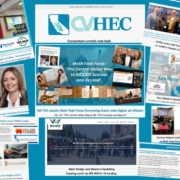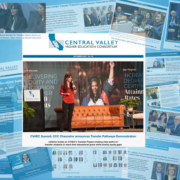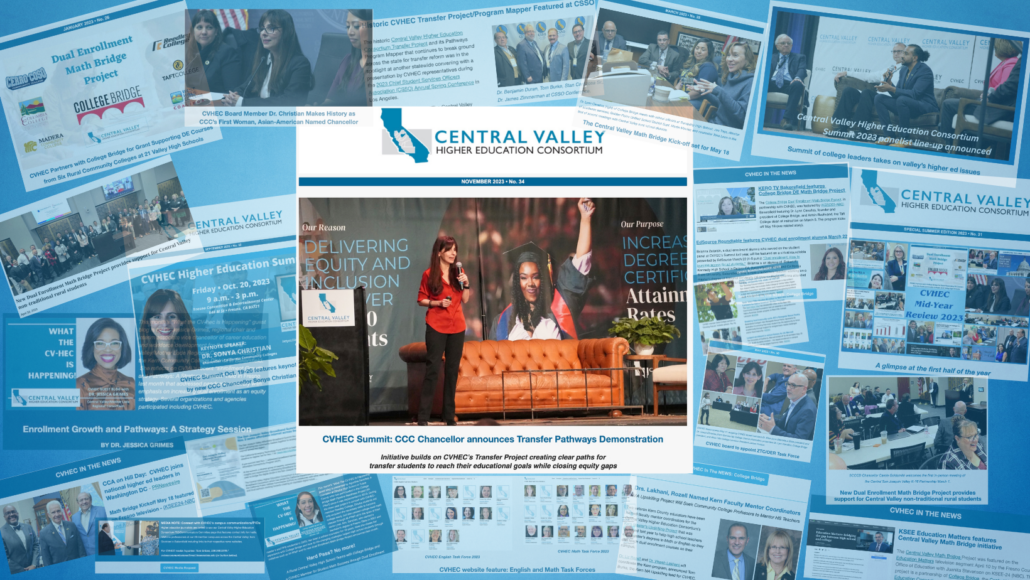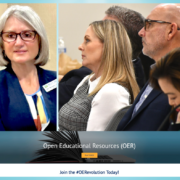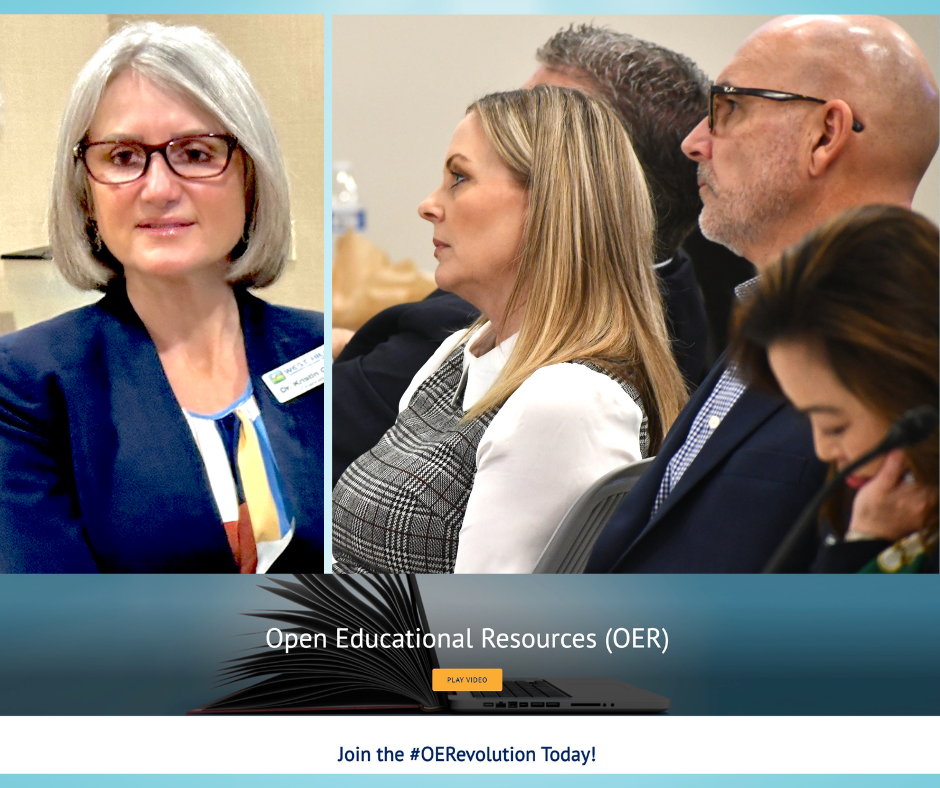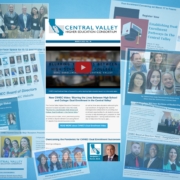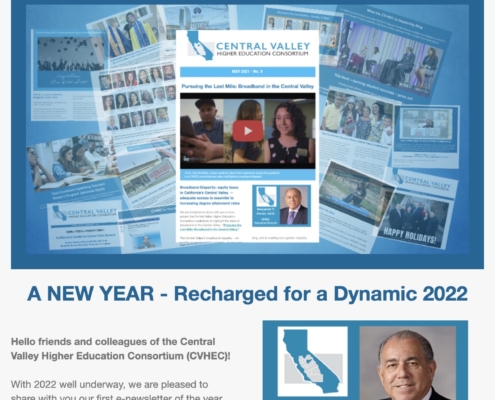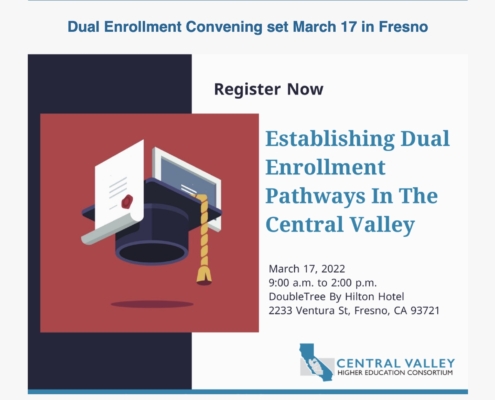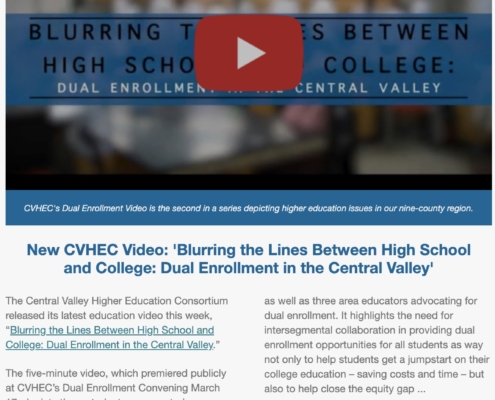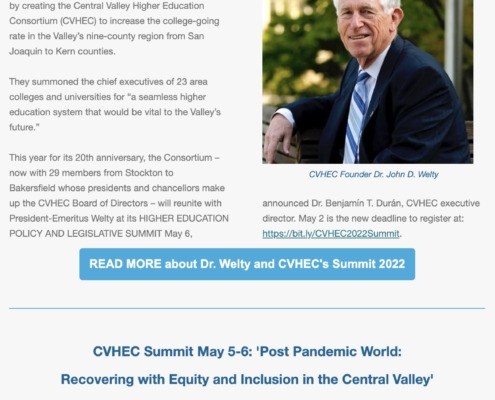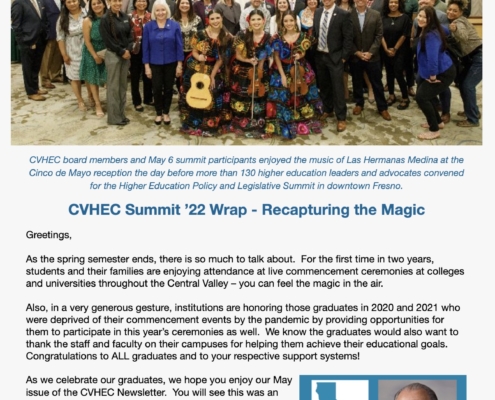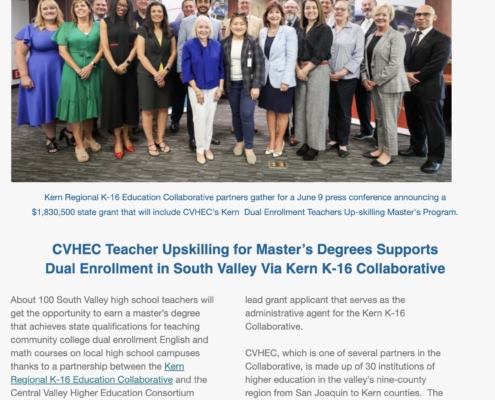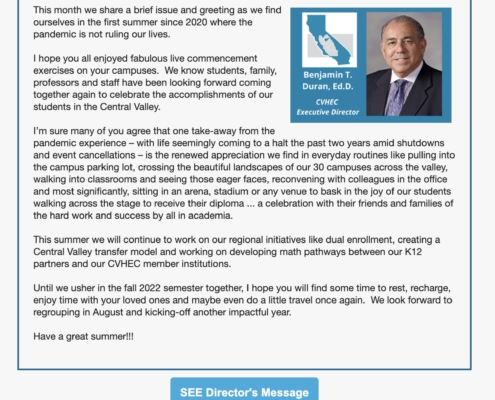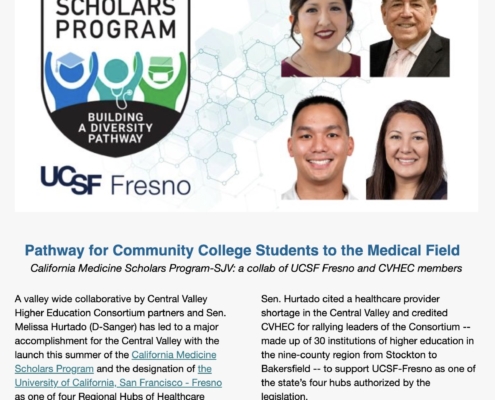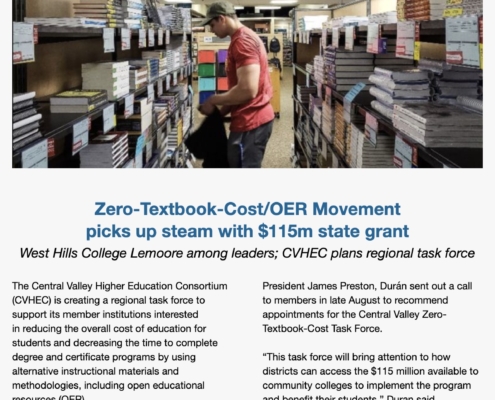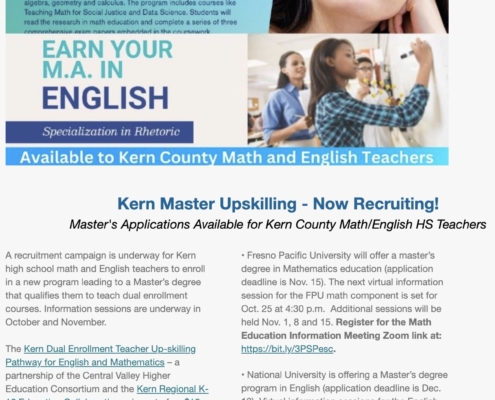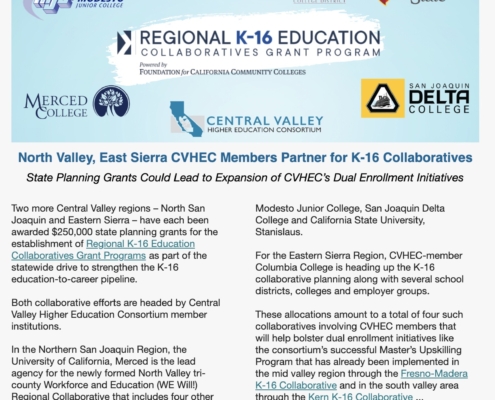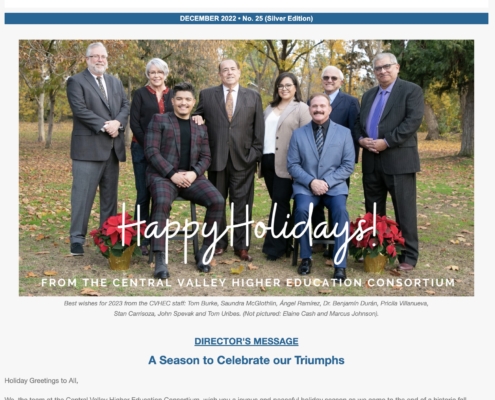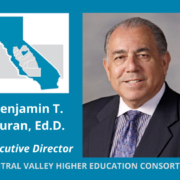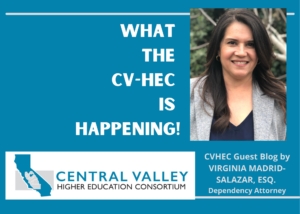CVHEC’s Year-In-Review 2023
Many strands coming together into one fabric
— a glimpse at the past 12 months
By CVHEC TEAM
(Tom Uribes, Dr. John Spevak and Stan Carrizosa)
The Central Valley Higher Education Consortium completes our 21st year with this 2023 Year-In-Review as seen through the headlines of our monthly e-newsletter, now in its 35th edition. (A special summer edition covers June-August).
While much was accomplished the past 12 months, perhaps our main achievement was a combination of many accomplishments, with the CVHEC team working simultaneously on many strands that come together into one fabric. We have remained committed to building a road to educational and career success for all students, especially those in grades 9 to 14, by continuing to focus on efforts with these major strategies throughout 2023:
- For community college transfer students, we expanded our Central Valley Transfer Project and its Program Pathways Mapper software, inspiring the California Community Colleges to adopt the program as a demonstration project for possible system-wide implementation in the future;
- For high school students, we have encouraged the ongoing growth of dual enrollment, most notably by partnering with College Bridge to help initiate and develop the Central Valley Math Bridge Program involving many of our community college members and their respective feeder high schools as well as expanding our Master’s Upskilling Program initiated two years ago into Kern County;
- We are fostering a Central Valley approach to the understanding of Assembly Bill 1705 through our English and Math Task Forces that are now in full swing with an eye to a productive 2024 and the implementation of this legislation that focuses on student success in math and English.
On a broader state and national scale, we closed the year this month with two major conferences: the Talent Hub Convening in Mobile, Alabama by the CivicLab where we revisited how partnerships between industry and education, working off the same playbook, are vital to cross-collaboration success for both landscapes; and the Complete College America conference in Las Vegas, Nevada where we explored “a clear-eyed vision for leading systems change” in higher education throughout our nation.
See this look back at the CVHEC 2023 story:
JANUARY
In January, we announced that the Dual Enrollment Math Bridge Project — a partnership between the Central Valley Higher Education Consortium, College Bridge and the Rand Corporation — was awarded a five-year $4 million federal grant in late December. The project, with a total budget of $6.7 million, involves six CVHEC community college members providing college-level math classes at 21 rural high schools that will improve and support college readiness for underprepared students in those colleges’ respective service areas beginning next fall. UPDATE: A kickoff for the participants has held in May. The participating CVHEC colleges are: Cerro Coso, Columbia, Madera, Reedley, Taft and West Hills College Coalinga.
‘First of its Kind’ CVHEC Transfer Project Gaining Statewide Interest
The CVHEC Transfer Project with the Program Pathways Mapper that began in 2019 was invited to present at several state and national events as the consortium continues to lead a concentrated effort to increase the number and success of community college transfers from the nine-county region to four-year colleges and universities. The project has grown to nine community colleges and three four-year institutions early research compiled for the project showing a direct correlation between students using the Program Mapper and important student success metrics.
CVHEC Website Feature: Professional Staff Page
CVHEC continued featuring the revamp of its website undertaken in the past year with a new section presented each month including the staff page in January. CVHEC’s 11 team members includes several who are retired from careers dedicated to serving students at their respective institutions of higher education – a service that now continues through CVHEC. All lend their energy, enthusiasm and experience to enhance student success and achievement throughout the region by collaborating with the consortium’s member institutions and the CVHEC Board of Directors.
FEBRUARY
CVHEC Board Member Dr. Christian Makes History as CCC’s First Woman, Asian-American Named Chancellor
Feb. 23, Dr. Sonya Christian, CVHEC board member who is featured in this summer issue with a vlog, made history when she was appointed as chancellor of the California Community Colleges System — the first Asian-American and the first woman to serve as chancellor for the largest and most diverse system of public higher education in the nation as well as a first-generation college graduate. Chancellor Christian began her term July 1 and for our Mach issue, she is featured in our “What the CVHEC is Happening” Blog discussing her time in the KCCD where she was president of Bakersfield College before serving as KCCD chancellor until her new assignment. In this issue, she is featured in the vlog discussing what lies ahead for the CCC.
Two veteran Kern County educators were named faculty mentor coordinators for the Central Valley Higher Education Consortium’s Kern Master’s Upskilling Project that was launched last year to help high school teachers earn master’s degrees in Math or English so they can teach dual enrollment courses on their campus: Dr. Liz Rozell (math) and Dr. Vikash Lakhani (English). UDPATE: The first cohorts of 21 math students and 25 English students in the Kern Master’s Upskill Program are underway through Fresno Pacific University and National University respectively.
CVHEC Website Feature: Dual Enrollment Page
The February issue’s website feature presented the CVHEC Dual Enrollment Page with the strategies undertaken by CVHEC’s Central Valley Dual Enrollment for Equity and Prosperity (CVDEEP) Task Force established in 2019 to identify and establish the best elements of an intentional and sustainable strategy for dual enrollment. CVDEEP is made up of more than 150 secondary and postsecondary education leaders who gather annually for dual enrollment convenings.
MARCH
The Central Valley Math Bridge Kick-off set for May 18
In March CVHEC announced that the movement to promote equity and college-readiness in mathematics via dual enrollment courses for underprepared students at rural Central Valley high schools next fall will formally launch May 18 with the Central Valley Math Bridge Kick-off in downtown Fresno presented by co-hosts College Bridge, Central Valley Higher Education Consortium and the Rand Corporation. UPDATE: 95 representatives of the first cohort of 13 Valley high schools in the new Central Valley Math Bridge Program convened with nine community college members for the May 18 kick-off where they began planning the program’s implementation. Rural high schools may still sign up for groundbreaking project that is ‘a model for meaningful dual enrollment pathways that can be replicated statewide.
Recruitment of community college mentors for HS teachers in Kern MA Upskilling Project is underway
The Kern Master’s Upskilling Project announced the recruitment of community college professors to serve as mentors for high school teachers enrolled in the project. The teachers can earn master’s degrees in math or English qualifying them to teach dual enrollment course at their high school campus.
Historic CVHEC Transfer Project/Program Mapper Featured at CSSO
The historic Central Valley Higher Education Consortium Transfer Project and its Pathways Program Mapper continues to break ground across the state for transfer reform with a presentation at another statewide convening: the 2023 Chief Student Services Officers Association (CSSO) Annual Spring Conference March 15 in Los Angeles.
APRIL
(APRIL 20, 2023) — A new state-funded math dual enrollment program will “positively impact” approximately 630 non-traditional students at seven rural high schools next fall through four area community colleges that are members of the Central Valley Higher Education Consortium. The Dual Enrollment (DE) Math Bridge – a partnership between CVHEC, College Bridge, the Fresno-Madera K-16 Collaborative, the Tulare-Kings College & Career Collaborative and CVHEC-member Fresno Pacific University – will provide equitable access to transfer-level math courses with embedded support for high school students who are disproportionately impacted and/or are not traditionally college-bound.
CVHEC leads California delegation at CCA Day on the Hill
(APRIL 20, 2023) — Dr. Benjamin Duran, executive director of the Central Valley Higher Education Consortium, joined Complete College America for its CCA Day on the Hill in Washington, D.C. May 16- 17 where “a network of higher education experts shared strategies and lessons for the implementation of higher ed strategies at scale.” Complete College America is a national non-profit alliance of state and higher education leaders. He met with Valley Congressmember Jim Costa.
CVHEC Summit re-scheduled for October 2023
The Central Valley Higher Education Consortium Higher Education Summit 2023, originally set for May, has been rescheduled for Oct. 20, 2023. The CVHEC Board of Directors will meet the day before the summit (Thursday, Oct. 19).
Recruitment for the second cohort of Kern high school math teachers to enroll in the Kern Dual Enrollment Teacher Upskilling Pathway for English and Mathematics that qualifies them to teach dual enrollment courses began in April with classes set to begin this August.
Dr. Sonya Christian, California Community College system chancellor, was the guest speaker for the Central Mother Lode Regional Consortium’s “Enrollment Growth & Pathways: A Strategy Session” April 25 hosted by Fresno City College President Robert Pimentel. CVHEC’s Angel Ramirez, operations and finance manager, and Elaine Cash, grants and programs coordinator, presented on the regional dual enrollment efforts taking place across the Central Valley.
MAY
The Central Valley Higher Education Consortium’s new Zero Textbook Costs/Open Educational Resources Task Force will form in the coming months, West Hills College Lemoore President James Preston reported to the CVHEC Board of Directors at its quarterly meeting May 11 in Fresno. The action highlighted a full agenda of information for the board made up of the chancellors, presidents and campus directors of 28 institutions of higher education in the Central Valley’s nine-county region. The next CVHEC board meeting is set for Oct. 19.
Representatives of the first cohort of 13 Valley high schools in the new Central Valley Math Bridge Program convened with nine community college members of the Central Valley Higher Education Consortium May 18 in Fresno to formally launch the program and plan for its implementation. Presented by co-hosts College Bridge, Central Valley Higher Education Consortium and the Rand Corporation, the event drew 95 participants to kickoff the project that promotes equity and college-readiness in mathematics via dual enrollment courses for underprepared students at rural high schools in the region next fall. Dr. Lynn Cevallos, founder and president of College Bridge, warned in her keynote, “The State of Mathematics in California,” that the dire reality of academic disjuncture which has culminated in a pending crisis could see “the doors to STEM careers closing for our students. Fortunately, the Math Bridge project is designed to keep those pathways open,” she said.
The Central Valley Higher Education Consortium was featured nationally on Radio Bilingue April 13 as a co-sponsor of one of 20 Broadband for All Digital Equity and Broadband Equity, Adoption, and Deployment (BEAD) Planning Regional-Local Workshops being held throughout the state by the California Department of Technology. CVHEC Executive Director Benjamín Durán served as a spokesperson at the Merced event held April 14 and was interviewed the day prior for the Spanish-language show Linea Abierta on Radio Bilingüe, the nation’s only daily Spanish-language talk show in public radio.
Merced College milestones: 60th Commencement and first in Los Baños
Merced College observed the 60th anniversary of its Commencement Ceremony held May 26 by presenting a full commencement ceremony at its Los Baños campus May 25 for this first time. The Los Baños ceremony was the latest in a series of investments and initiatives to grow the campus and give Westside students a complete educational experience close to home.
SUMMER EDITION
(Published July 19, 2023)
Supreme Court ruling is not the death of Affirmative Action but rather a challenge
Statement by Dr. Benjamín Durán, CVHEC executive director, on the June 29 United States Supreme Court Affirmative Action ruling: ‘in one week — after decades of progress — equity, diversity and access in higher education were simultaneously under attack. However, I offer that this Supreme Court ruling is not the death of Affirmative Action but rather a challenge to renew and reinforce its spirit and outcomes.” See July Director’s Message.
Students at Modesto Junior College and Columbia College will have increased access to University of California, Merced thanks to an agreement signed July 11 between the university and Yosemite Community College District: the Merced Promise Pathway Memorandum of Understanding (MOU) between the three Central Valley Higher Education Consortium members that provides a clear, streamlined pathway to UC Merced for MJC and Columbia students as well as a variety of supports to help them prepare for life at a four-year university. See Merced Promise Pathway story.
SOFT START program awarded $2.4M for two CVHEC members in ‘Internet for All’ funding
A collaboration that prepares at-risk students and low-income residents for careers in IT-cybersecurity is set to launch this fall by Central Valley Higher Education Consortium members Fresno State and Fresno City College in partnership with the Fresno County Public Library as part of a two-year, $2.4 million federal grant by the National Telecommunications and Information Administration’s Connecting Minority Communities Pilot Program announced in February. Fresno State was one of five minority-serving institutions to receive a portion of over $18.5 million in “Internet for All” funding meant to expand community technology hubs, upgrade classroom technology and increase digital literacy skills as California faces a shortage of about 73,000 cybersecurity professionals. See CVHEC story and KSEE-24 NBC “Education Matters” report.
UPDATE: Registration is available for two new Fresno State SOFT START Cybersecurity cohorts that begin Jan. 31, 2024: the Beginning Certificate session and the first Intermediate Certificate session. FCC certificate programs will be rolled out in fall 2024.
WHAT THE CV-HEC IS HAPPENING BLOG Pt. 2: CCC Chancellor Sonya Christian
For this summer edition of our “What the CV-HEC is Happening” blog, we feature part two of California Community Colleges Chancellor Sonya Christian, Ph.D, with this podcast interview.
See CVHEC CCC Chancellor Blog.
SEPTEMBER
(Published Sept. 7, 2023)
CVHEC Summit Oct. 19-20 features keynote
Dr. Sonya Christian, chancellor of the California Community Colleges, will return “home” Oct. 20 when she delivers the keynote for the Central Valley Higher Education Consortium Summit 2023 in Fresno. With the theme “Student Success through Equity and Inclusion — Thriving in the Central Valley,” the summit will be held from 9 a.m. to 3 p.m. Friday, Oct. 20, at the Fresno Convention Center’s Ernest E. Valdez Exhibit Hall. See summit keynote story.
Open Educational Resources movement launched with $580,180 K-16 grant to CVHEC members
The pioneering Open Educational Resources Improvement Project – a collaboration of Central Valley Higher Education Consortium members and partners – kicks off with a $580,180 state grant as well as a new CVHEC OER Task Force and convening planned for later this fall. CVHEC-member West Hills Community College District recently announced the Fresno-Madera K-16 Collaborative Mini-Grant Award for the groundbreaking initiative that is poised to usher in a new era of educational opportunities by revolutionizing learning, teaching and research materials across the Central Valley. The project is in collaboration with the State Center Community College District and its campuses — Fresno City College, Madera Community College and Reedley College (all consortium members) — and CVHEC. See OER story.
UPDATE: plans for the OER convening and task force announcement will be forthcoming in early 2024.
CVHEC 2022 Mini Grant funds FPU Tri-Alpha Honor Society for first-generation students
A Central Valley Higher Education Consortium Mini-Grant awarded to member Fresno Pacific University earlier this year helped establish a local chapter of the Alpha Alpha Alpha Honor Society (Tri-Alpha) that recognizes and engages first-generation college students. The $6,477 CVHEC grant created undergraduate research fellowships that allows the university to provide research stipends for students and faculty as well as covered student membership fees; two induction ceremonies; and speaker honoria and refreshments for monthly chapter meetings. The CVHEC Mini-Grants, funded by the College Futures Foundation, are awarded to member institutions in support of the consortium’s mission to increase degree attainment rates. See FPU Mini-grant story.
CVHEC website feature: English and Math Task Forces
The Central Valley Higher Education Consortium launches two new web pages this month featuring its two intersegmental task forces consisting of math and English educators representing the 15 community college members in the region that are part of the 28-member consortium. First formed in 2019 under the leadership of Dr. John Spevak, a CVHEC coordinator and a former Merced College vice president, the mission of the English and Math Task Forces is to streamline math and English pathways for students by examining topics and issues of those disciplines and recent legislation as part of CVHEC’s mission: improve certificate and degree completion rates in the nine-county region from San Joaquin to Kern. See the English Task Force and Math Task Force stories.
The Tachi Yokut Tribe donated $3 million to the West Hills Community College Foundation for a comprehensive Native American studies program at West Hills College Lemoore. See Tachi donates story.
UCSF Fresno celebrates new doctors for Central Valley/state
It takes 11 years or more to produce a practicing physician after high school, depending on the specialty. On June 15, UCSF Fresno celebrated the completion of years of training for more than 100 graduates. See UCSF Fresno new doctors story.
WHAT THE CV-HEC IS HAPPENING BLOG (September 2023): Teachers
As students return to classrooms for the fall semester, this month’s “What the CV-HEC is Happening” Blog is a message about the lifelong impact that teachers deliver for their students by Dr. John Spevak, a former teacher who is a vice president-emeritus of Merced College and currently a regional coordinator for CVHEC. See Teachers Blog.
OCTOBER
(Published Oct. 10, 2023)
Summit of college leaders takes on valley’s higher ed issues
Several community college chancellors and presidents lead the charge Oct. 20 when the heads of 28 valley colleges and other educators and policy makers convene for the Central Valley Higher Education Consortium Summit 2023 in Fresno that includes a student panel discussing their higher education experiences and a federal education legislative update by U.S. Congressman Jim Costa. CVHEC released its line-up of panelists for the summit which features a keynote address by Dr. Sonya Christian, California Community Colleges chancellor with the theme “Student Success through Equity and Inclusion — Thriving in the Central Valley,” at the Fresno Convention Center’s Ernest E. Valdez Exhibit Hall. See the CVHEC Summit panelists story.
UPDATE: At the Central Valley Higher Education Summit, Chancellor Christian announced an historic new initiative, the Central Valley Transfer Pathways Demonstration Project, in a partnership with and modeled after CVHEC’s Transfer Project.
CVHEC Math Task Force meets in-person Oct. 13 for AB 1705 follow-up
With two convenings this month, the Central Valley Higher Education Consortium Math Task Force is tackling questions regarding California Assembly Bill 1705 requiring that California’s community colleges expand their efforts to enroll and support students in transfer-level math courses in the face of implementation deadlines looming in 2024. In partnership with the California Community College Chancellor’s Office and the Charles A. Dana Center at the University of Texas at Austin, CVHEC presents a virtual sessions Oct. 6 to addressing areas of confusion regarding the bill and its implementation and an in-person session, “AB1705 Student Success Workshop,” Oct. 13 to explore how to best support students within the framework of AB1705 — a follow up to AB 705, previous legislation that fundamentally reshaped placement and remediation at the community colleges. See MTF AB1705 story.
Historic Transfer Project spurs statewide movement to increase transfer rates
As we enter the third phase of the Central Valley Transfer Project, we are pleased to report great progress has been made ranging from its infancy two years ago to nationwide interest — including possible expansion into another region of California in the near future — as our team is invited regularly to present at state and national conferences as well as at the Central Valley Higher Education Consortium’s 2023 Summit Oct. 20. Originally born out of dissatisfaction with Central Valley community college transfer rates to University of California, Merced, this effort has spurred a statewide movement at multiple levels to increase the number of successful community college transfers to four-year institutions with the Program Pathway Mapper software and laid the groundwork for the California Community Colleges’ Central Valley Transfer Pathways Demonstration Project announced at the summit. See Transfer Project update story.
WHAT THE CV-HEC IS HAPPENING BLOG: Master’s Upskill Program Success Story
Sanger West High School teacher JADE MARTÍNEZ recounts road to a post-bac degree and her first dual enrollment class. See Master’s Upskill blog.
Reedley and Merced Colleges host Math Bridge orientation for feeder high schools
Central Valley Higher Education Consortium members Merced and Reedley community colleges hosted high school math educators and administrators from their respective service area schools Sept. 21 for an orientation about the Central Valley Math Bridge Program that is now in full swing. See Math Bridge story.
NOVEMBER
(Published Nov. 6, 2023)
CVHEC Summit leaves myriad of takeaways for participants
For Araceli Tilley, an alumna of Merced College, the Program Pathway Mapper used by the Central Valley Higher Education Consortium Transfer Project proved to be not only useful for her transfer to UC Merced in fall 2022, it provided her an easy way to map her college courses for her final two years of college at UC Merced that is leading up to graduation in May 2024 with a degree in psychology. Araceli shared her experiences on the student panel at the Central Valley Higher Education Consortium Summit 2023 held in Fresno Oct. 20 where the breadth and depth of CVHEC activities such as the Transfer Project were showcased. Joined by four other students who shared their experiences in activities CVHEC has sponsored and how much their success could be attributed to those initiatives, Araceli’s remarks at the summit “earned” her a trip with the CVHEC team to share her transfer experiences statewide. Presented by CVHEC and sponsored by the College Futures Foundation, the summit attracted 184 higher education officials and educators, legislators and partner representatives for a full day of discourse surrounding Dual Enrollment, Transfers, Math Pathways and Open Educational Resources with several panels introduced and moderated by CVHEC board members. See CVHEC Summit 2023 story and photo gallery.
CCC Chancellor announces Transfer Pathways Demonstration at CVHEC Summit
The California Community College Chancellor’s Office will launch a new initiative, the Central Valley Transfer Pathways Demonstration Project, Chancellor Sonya Christian announced at the 2023 Central Valley Higher Education Summit in Fresno Oct. 20. In a partnership with the Central Valley Higher Education Consortium, the CV Transfer Pathways — modeled after CVHEC’s Transfer Project — entails developing and publishing 2 + 2 transfer pathways using the Program Pathways Mapper software to clarify the path to four-year colleges for transfer students as well as for campus staff in creating clear paths for transfer students to reach their educational goals while closing equity gaps. See the CCC Chancellor Transfer Announcement story.
Math Task Force begins discussion of AB1705 implementation – Nov. 17 next
With an eye towards ensuring the success rates of their students enrolled in corequisites to gateway math courses, community college members of the Central Valley Higher Education Consortium Math Task Force kicked off a series of convenings in October to begin preparing for implementation of Assembly Bill 1705 in the 2024-25 academic year. CVHEC announced that follow up meetings are set for Nov. 17 and Jan. 26 to continue a year-long discussion of ideas and options with the task force members and other educators in an ongoing quest for equitable mathematics under AB705 and AB1705. See Math Task Force AB1705 covenings summary story.
WHAT THE CV-HEC IS HAPPENING BLOG: Expanding the Reach of the Central Valley Math Bridge
College Bridge Vice President Owynn Lancaster updates the Math Bridge project and, after successful College Orientation meetings in September, the College Bridge team has been darting up and down the San Joaquin Valley meeting with interested feeder highs schools to onboard and launch them for the coming academic year’s CV Math Bridge Project. See Math Bridge update blog.
The San Joaquin Valley Broadband Summit Nov. 9 seeks affordable internet across the region
The San Joaquin Valley Affordable Broadband Summit Nov. 9 will bring key community leaders together to strategize for the adoption of affordable internet across the region. The California Emerging Technology Fund (CETF) is hosting the virtual summit that includes a pre-summit Nov. 1 to address broadband barriers, resources and solutions such as the Affordable Connectivity Program (ACP). At the summit, a diverse group of experts, community leaders, and advocates will share their insights and experiences in addressing Broadband Access in the San Joaquin Valley as they seek to bridge the digital divide in the San Joaquin Valley. See Broadband Summit story.
Comcast pledges $100,000 in scholarships to 5 CVHEC CC members
Comcast California presented a $100,000 donation to five Central Valley Higher Education Consortium-member community colleges ($20k each) to support the next generation of students eager to pursue careers in Science, Technology, Engineering, Arts and Mathematics (STEAM): Fresno City College, Clovis Community College, Madera College and Reedley College all in the State Center Community College District and College of the Sequoias. See Comcast STEAM story.
Community College CEOs first caucus: area state legislators address policy issues
The newly-formed Central Valley Community College CEO Caucus held its first convening Oct. 26 with valley legislators to discuss a variety of policy issues facing community colleges. The CVCCCEO Policy Summit and Legislator Convening, which brought together Central Valley state legislators, chancellors and presidents, was hosted at Madera Community College by President Ángel Reyna and led by Merced College President Chris Vitelli, chair of the Central Valley Community College CEO Caucus, and West Hills Community College District Chancellor Kristin Clark, board chair for the Central Valley Higher Education Consortium. See CVCCCEO Caucus story.
KCCD receives ACCT 2023 Pacific Region Equity Award
The Kern Community College District was awarded the 2023 Pacific Region Equity Award from the Association of Community College Trustees (ACCT) at ACCT’s annual conference in Las Vegas, Nevada last month. ACCT is an organization representing more than 6,500 community college trustees throughout the United States. See the KCCD equity award story.
CVHEC In The News 2023: Affirmative Action OP ED
https://cvhec.org/cvhec-in-the-news-affirmative-action-oped-fresno-bee/
Following the historic Supreme Court June 29 decision that severely limited, if not effectively ended, the use of affirmative action in college admissions, Central Valley Higher Education Consortium Executive Director Benjamín Durán wrote of his reaction and that of many colleagues, family and friends in his Director’s Message for the CVHEC summer newsletter edition. Dr. Durán’s message also served as the basis for this op-ed column that was published in the Valley Voices section of The Fresno Bee Opinion page July 24.
CVHEC In The News 2023: Bee panel examining decline of Latino higher ed enrollment features CVHEC leader
Dr. Benjamín Durán, executive director, of the Central Valley Higher Education Consortium, will participate on a virtual panel presented Nov. 8 (6-7 p.m.) by The Fresno Bee’s La Abeja staff, “Central Valley Latinos and higher education completion: Is there a growing gap?” The hour-long panel, presented in three 20-minute breakouts, features state and Central Valley education leaders examining the barriers to Latino student success and opportunities available. Dr. Duran will be joined by Michele Siqueiros, president of the Campaign for College Opportunity as well as Olga Rodríguez, director of the Public Policy Institute of California Higher Education Center who recently presented at the CVHEC summit in Fresno, and Carlos Nevarez, interim provost and vice president of academic affairs at Sacramento State. Fresno State students Crystal Navarro and Joseph Aquino also will discuss their experiences. See story.
CVHEC In The News 2023: CETF helps Planada establish digital community
Together with Comcast, California Emerging Technology Fund provided a $15,000 grant for the Planada Elementary School District to replace 3 laptop carts and purchase 40 Chromebooks for their students. Dr. Benjamín Durán, executive director, of the Central Valley Higher Education Consortium and Merced College president-emeritus, returned to his hometown for the presentation. See story.
CVHEC In The News 2023: Valley college leaders unveil plan to increase university transfers
The recent Central Valley Higher Education Summit and announcement of the California Community College Central Valley Transfer Pathways Demonstration Project, by Chancellor Sonya Christian was featured by KVPR Radio and GV Wire. See story
DECEMBER
(Published Dec. 20, 2023)
“The CVHEC Way to Math Success — Implementing AB1705” – Jan. 26 convening set
WHAT THE CV-HEC IS HAPPENING BLOG (September 2023): Gift of Math
Merced College: DR. BENJAMÍN T. DURÁN BUSINESS RESOURCE CENTER
Fresno Bee panel: “Central Valley Latinos and higher education completion: Is there a growing gap?”
CVHEC takes unified Central Valley voice to national/state higher ed conferences
What the CV-HEC Is Happening Blog: Math Bridge Update
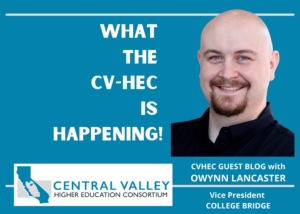 This month’s “What The CV-HEC Is Happening” guest blog is an update of the Math Bridge program presented by Owynn Lancaster, vice president for Academic Strategy with College Bridge, a California non-profit based in Los Angeles County dedicated to forging a path towards both college access and success for underrepresented students. College Bridge is a partner with the Central Valley Higher Education Consortium in the innovative program designed to improve math outcomes for struggling 11th and 12th graders and streamline Math pathways into college. Funded by a five-year $4 million grant through the US Department of Education’s Education Innovation and Research (EIR) Program in January, this ambitious endeavor was kicked off in May with a convening of more than 150 valley K-16 educators in Fresno to begin the onboarding process for this historic intersegmental collaboration between CVHEC member community colleges and high schools in their respective service areas. That initiative was followed in April with a $1.1 million state grant to CVHEC/College Bridge partnership through the Central San Joaquin Valley K-16 Partnership creating the Dual Enrollment (DE) Math Bridge that will provide equitable access to transfer-level math courses with embedded support for high school students who are disproportionately impacted, and/or are not traditionally college-bound. This fall, the College Bridge and CVHEC Math Bridge teams have been visiting campuses to continue the onboard process in preparation for the program’s launch next fall.
This month’s “What The CV-HEC Is Happening” guest blog is an update of the Math Bridge program presented by Owynn Lancaster, vice president for Academic Strategy with College Bridge, a California non-profit based in Los Angeles County dedicated to forging a path towards both college access and success for underrepresented students. College Bridge is a partner with the Central Valley Higher Education Consortium in the innovative program designed to improve math outcomes for struggling 11th and 12th graders and streamline Math pathways into college. Funded by a five-year $4 million grant through the US Department of Education’s Education Innovation and Research (EIR) Program in January, this ambitious endeavor was kicked off in May with a convening of more than 150 valley K-16 educators in Fresno to begin the onboarding process for this historic intersegmental collaboration between CVHEC member community colleges and high schools in their respective service areas. That initiative was followed in April with a $1.1 million state grant to CVHEC/College Bridge partnership through the Central San Joaquin Valley K-16 Partnership creating the Dual Enrollment (DE) Math Bridge that will provide equitable access to transfer-level math courses with embedded support for high school students who are disproportionately impacted, and/or are not traditionally college-bound. This fall, the College Bridge and CVHEC Math Bridge teams have been visiting campuses to continue the onboard process in preparation for the program’s launch next fall.
Expanding the Reach of the
Central Valley Math Bridge
BY OWYNN LANCASTER
College Bridge
After our successful College Orientation meetings in September, the College Bridge team has been darting up and down the San Joaquin Valley, meeting with interested feeder highs schools to onboard and launch them for the coming academic year’s CV Math Bridge Project.
Inspiring our efforts, two amazing CVHEC member colleges have “jumped to lead the pack” as Dr. Lynn Cevallos, our College Bridge president, often says. The first of those with an impressing showing come from Merced College where their team has helped us garner interest from seven possible high schools! Showing the region’s commitment to opening options for their students in math and the impressive connecting power of the college’s administration.
In equally exciting efforts, San Joaquin Delta College helped to secure two committed high school partners from Stockton Unified, with interest from others in their region. Those two Stockton schools, Amos Alonzo Stagg High School and Captain Charles M. Weber of Applied Science and Technology have been two of the smoothest schools to onboard so far! More importantly addition of these schools and the partnership with Delta College now helps us open the CV Math Bridge Project across the breadth of the Valley.
With schools as far north as Stagg High School and as far south as Taft Union High School the reach of this project is now slightly smaller than the state of South Carolina! This means several more flights and drives are still ahead for our College Bridge team to continue to onboard and launch these high school partners, but in the end, we are excited by this transformative work.
The CV Math Bridge’s first cohort of schools will be starting in the coming academic year, 2024-2025, and there’s still room for more in the second cohort starting in academic year, 2025-2026. We invite high schools interested in participating to reach out and contact me at Owynn.Lancaster@college-bridge.org.
Also see: https://bit.ly/CVHECblog1223-GiftOfMath
CVHEC Blog: Master’s Upskill Program Success Story
This month’s “What The CV-HEC Is Happening” guest blog is presented by Mrs. Jade Martinez, an English teacher at Sanger West High School in Sunnyside (east Fresno) who earned a master’s degree from National University in December 2022 through CVHEC’s Master’s Upskilling Program. Jade earned her bachelor’s degree at Fresno State in 2020 and began her teaching career at SWHS that fall. Here, she shares her experience fulfilling an academic dream of obtaining a Master’s that has led to teaching dual enrollment courses this fall, the primary objective of the Master’s Upskill Program.
Sanger teacher recounts road to a post-bac degree
and her first dual enrollment class
BY JADE MARTÍNEZ
Dual Enrollment English Teacher
Sanger West High School
I went back to school when my son was two years old and my daughter was six months old, starting at Reedley College. I worked nearly full-time and was a full-time student as well, inspired to be a life-long learner ready for the demands of teaching.
I knew that I wished to complete my Master’s degree in English but soon realized that I would need an additional year or two of prerequisite courses before I could do it. The idea was placed on the backburner, as I needed to focus on becoming a teacher and providing for my family after nearly eight years of building debt.
When I was in my final student-teaching at Sanger West in 2020, my master teacher became our English Language Development curriculum support provider (CSP) so I interviewed for his vacated position. Because of his promotion, I continued working with my students for the whole year rather than one semester. Within a few months of becoming a teacher, I learned about CVHEC Master’s Upskilling Program being offered through Sanger Unified in partnership with National University that would qualify high school teachers to teach dual enrollment courses at their high school campus.
An additional plus was that there would be a specialization in rhetoric attached to this degree, which matched my undergraduate emphasis on composition and rhetoric. I was instantly interested because I already qualified without the additional prerequisites but I was also hesitant since I was still considered an intern with an emergency credential at the time.
After consulting with my mentor and professors, I was ready to take on the challenge.
I began the upskilling program while I worked on induction simultaneously, spending nearly every hour away from work completing assignments for each program. Many mornings I woke up early to complete work before my kids were awake. When I had free time at work, I read various texts for classes and completed mentor logs, professional development, and my individual learning plan. Once I was home, I could afford to take a short break for an hour and had to begin work once more. There were many times when my kids would ask me “Are you done with homework yet, mom?” and unfortunately, I would not be finished until long after they went to sleep for the evening.
Once again, the mom-guilt set in as I tried to see the positives that this program would bring, trying to avoid the voice in my head telling me that I am not a good mother because of all the years of sacrificing time together so that we could be financially stable enough to not struggle anymore. Many days I forced myself to stay strong and keep pushing, knowing that with each completed class I would be closer to the end of my education journey for a while.
I received the news that my thesis was approved right before my 30th birthday. I always told myself that I would graduate college by the time I turned 30 yet I went one step further and completed my master’s as well as having my dream job being a teacher. All of the sacrifices and long hours had finally paid off once that piece of paper was framed and hung on my classroom wall.
A world of opportunities opened in front of me, as I soon became the leader for my professional learning team (PLT) and most recently I was asked to begin the dual enrollment program for English 1A at Sanger West High School.
In August, I received confirmation for that assignment and now this fall I am teaching the dual enrollment course thus achieving the objective CVHEC set with its leadership in this area not only for both high school student advancement to degree or certificate attainment but also for high school teachers seeking professional development.
In just one month, I am enjoying the freedom that teaching dual enrollment provides. Even the challenges we face — that any program in its infancy may experience — are providing a valuable learning episode of its own. But the overall sense of accomplishment that comes from knowing we are forging a path that ultimately helps our students is the motivating inspiration.
And I know that my degree affords many other opportunities such as editing, freelance writing or even becoming a professor at the community college level. I have progressed two unit levels on the payscale and also receive a monthly stipend just for having my postbac degree.
At last, I can fully provide for my family without hardship or struggle!
Open Educational Resources movement launched with $580,180 K-16 grant to CVHEC members
Open Educational Resources has the potential to save students millions of dollars in textbook and material costs that helps minimize financial barriers impeding access to quality education, said Dr. Kristin Clark (left), WHCCD chancellor, with West Hills College-Coalinga President Carla Tweed and West Hills College-Lemoore President James Preston.
OER Task Force and convening
planned for this fall
The pioneering Open Educational Resources Improvement Project – a collaboration of Central Valley Higher Education Consortium members and partners –kicks off with a $580,180.00 state grant as well as a new OER Task Force and convening planned for later this fall.
CVHEC-member West Hills Community College District recently announced the Fresno-Madera K-16 Collaborative Mini-Grant Award for the groundbreaking initiative that is poised to usher in a new era of educational opportunities by revolutionizing learning, teaching and research materials across the Central Valley.
The project is in collaboration with the State Center Community College District and its campuses — Fresno City College, Madera Community College and Reedley College (all consortium members) — and CVHEC.
Open Educational Resources has the potential to save students millions of dollars in textbook and material costs, said Dr. Kristin Clark, WHCCD chancellor, in the Aug. 22 award announcement. This helps minimize financial barriers that impede access to quality education.
“OER is pivotal in alleviating financial burdens on our students with the transformative power to enrich education, making it more affordable and accessible,” Chancellor Clark said.
The free exchange of knowledge
The initiative promotes accessibility, reusability, adaptation and redistribution said the chancellor who also serves as chair of the CVHEC Board of Directors made up of the chancellors, presidents and campus directors of 28 Central Valley institutions of higher education in the nine-county region from San Joaquin to Kern counties.
OER encompasses a diverse range of materials, such as textbooks, curricula and multimedia resources made available under open licenses that encourage the free exchange of knowledge.
Since 2016, West Hills College Lemoore has been at the forefront of OER development, showcasing WHCCD’s dedication to providing an inclusive and equitable learning environment that serves as a testament to the district’s commitment to academic excellence.
Chancellor Clark said the Fresno-Madera K-16 Collaborative Mini-Grant Award “will empower us to advance education in the Central Valley by leveraging the potential of Open Educational Resources underscoring our unwavering commitment to fostering innovation and student success.”
She called the grant “a testament to the collaborative spirit of the Central Valley’s educational community and the strides we can achieve together. We are incredibly excited to embark on this significant endeavor alongside our esteemed partners.”
Statewide leadership to a ZTC degree pathway
Dr. Benjamín Durán, CVHEC executive director, said this visionary partnership of consortium members will expand on WHC-Lemoore’s pioneer work with faculty and instructional administrators developing Open Educational Resources /Zero Textbook Cost textbooks, courses and pathways that serve area institutions and their feeder high schools.
“This Central Valley OER movement provides statewide leadership leading to a full ZTC degree pathway in Elementary Education for our students that immediately serves the Fresno and Madera County areas,” Duran said.
“We commend our community college members for uniting under CHVEC for this grant, enabling them to create a wealth of high-quality educational resources for the benefit of students and educators throughout the Central Valley and beyond.”
An evolution of teaching and learning
West Hills College-Lemoore President James Preston, who serves on the statewide California Community Colleges ZTC Task Force, said in a CVHEC “What Is Happening Blog” a year ago that his campus jumped into the “OERevolution” as a way to eliminate textbook cost barriers for students.
“However, what started as a revolution against textbook publishers and outrageous prices quickly turned into an evolution of teaching and learning as faculty utilized OER materials in creative and powerful ways,” wrote President Preston.
“Thousands of hours of teamwork, a few additional grants and six years later West Hills College Lemoore has saved students over $8 million dollars, revolutionized teaching and learning and currently offers 62 percent of our courses in the ZTC format with a dozen degrees and certificates that students can complete without any textbook costs.”
In a presentation to fellow CVHEC board members at their quarterly meeting in May, President Preston said the use of ZTC is “a huge win for diversity and equity” that “allows for culturally responsive relevant materials.”
OER/ZTC Task Force
Dr. Duran said the next step for CVHEC is to finalize formation this fall of the OER/ZTC Task Force consisting of representatives from the consortium’s 28-member institutions.
“This new task force will support our members as they assist students attain basic needs that help navigate their way towards the completion of their educational goals. “
He said the first OER/ZTC Task Force Convening will be set for later this fall when task force members and other individuals and campuses can further explore strategies for addressing those basic needs.
For more information: centralvalleyhec@gmail.com.
For media inquiries:
WHCCD – Amber Myrick (559.934.2132) ambermyrick@whccd.edu
CVHEC – Tom Uribes (559.348.3278) cvheccommunications@mail.fresnostate.edu
SCCCD – Jill Wagner jill.wagner@scccd.edu
Also see:
- WHCCD full press release (link to come)
- CVHEC Board to appoint ZTC/OER Task Force (CVHEC e-Newsletter – May 2023).
- Zero-Textbook-Cost/OER Movement picks up steam with $115m state grant (CVHEC e-Newsletter – September 2022).
- What the CV-HEC is Happening Blog by WHC-L President James Preston(CVHEC e-Newsletter – September 2022).
- WHC-Lemoore OER– (https://www.westhillscollege.com/lemoore/oer/)
- OER video– (https://youtu.be/qop5VhYv2nw)
- California community colleges implement zero-textbook-cost(Inside Higher Ed – Sept. 19, 2019)
WHAT THE CV-HEC IS HAPPENING BLOG (December 2022): Year-In-Review/Silver Edition
Celebrating Our 25th Edition with a Look Back at 2022 E-Newsletter Stories
The December “What the CV-HEC is Happening” Blog is presented by Tom Uribes, CVHEC’s communications/media coordinator who joined CVHEC in 2020 after serving as a California State University public affairs specialist for two Fresno State offices in a 30-year career from 1988-2017: the University Outreach Services and University Communications offices, where he also served as the University’s public information officer for two decades of that career. Among his current projects is editor of the CVHEC e-newsletter which presents its 25th edition with this issue. His blog looks back at some of the newsletter stories published in 2022.
By Tom Uribes
CVHEC Communications/Media Coordinator
With the close of 2022 – and near resumption of post-pandemic “normal life” – we present our now annual review of top stories featured in the Central Valley Higher Education Consortium e-newsletter for this December issue: our 25th edition!
This Silver Edition of the CVHEC e-newsletter crowns a venture that started when I signed on with the Consortium in March, 2020 just as the pandemic broke — sending me back home after just one day in CVHEC’s office in Fresno to work out of a hastily revived bedroom office.
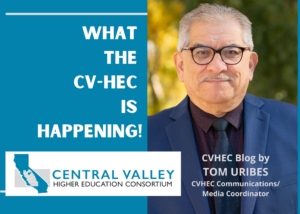 Under the direction of my new CVHEC boss at the time, Virginia Madrid-Salazar (who I had hired as one of my first news interns when she was a Fresno State student in the late 80s), we published our first issue in June 2020 and when Virginia left us in August 2021 to play lawyer, Ángel Ramírez assumed this CVHEC communications partnership as my lead. His able and competent guidance and leadership has continued the solid foundation started by Virginia for the growth of this e-newsletter into this, its 25th edition.
Under the direction of my new CVHEC boss at the time, Virginia Madrid-Salazar (who I had hired as one of my first news interns when she was a Fresno State student in the late 80s), we published our first issue in June 2020 and when Virginia left us in August 2021 to play lawyer, Ángel Ramírez assumed this CVHEC communications partnership as my lead. His able and competent guidance and leadership has continued the solid foundation started by Virginia for the growth of this e-newsletter into this, its 25th edition.
We hope you enjoy this milestone issue — a compressed journey through the past 12 months of the Central Valley Higher Education Consortium. Topics range from our Dual Enrollment Convening and Legislative and Policy Summit in in the spring, the historic CVHEC Board of Directors quarterly meetings, the appointments of new campus leaders, the growth of our “What the CV-HEC is Happening” Blog first introduced in 2021 and more.
We strive to tell the CVHEC story: bringing together 30 Central Valley institutions of higher education through its board of directors made up the presidents and chancellors in the nine-county region who make history every time they meet to deliberate, act and speak as one voice on higher education issues and policies affecting our region — a feat not seen too often throughout the academia CEO world.
We presented our first year-in-review looking back at 2021 in January with Dr. Benjamín Durán, CVHEC executive director, ushering in the New Year in his monthly director’s message:
“We at CVHEC wish you a dynamic start to the spring 2022 semester with hopes of reaching some sort of a new normal that will lead us to working, meeting our students and convening in-person in the near future,” Dr. Duran messaged that month. “While the pandemic has put the squeeze on all of us the past two years, we are more determined than ever to conquer that challenge as we have so many others.”
CV-HEC BLOG: Dual Enrollment – An Equity Change-Maker
Our first CV-HEC Guest Blog of the year in February featured a guest writer who was instrumental in planting seeds for our “What the CV-HEC is Happening” Blog, the aforementioned Virginia Madrid-Salazar, Esq., former CVHEC strategies lead turned private law practice dependency attorney. Virginia shared some observations on dual enrollment from her unique dual perspective stemming from when she worked with CVHEC setting up the CVDEEP and its convening and as a mom of a dual enrollment student.
“As the strategies lead for the Central Valley Higher Education Consortium, it was an honor to work alongside area educators to affect transformational changes that have occurred in the region’s higher education sphere during that period,” said Virginia who wrote CVHEC’s white paper in 2020: CVDEEP White Paper: “Dual Enrollment in the Central Valley, Working Toward a Unified Approach for Equity and Prosperity.”
Dual Enrollment Convening: Face-To-Face Space for K-12 and Higher Ed and new DE Video
More than 135 secondary and postsecondary educators assembled for the “Establishing Dual Enrollment Pathways in the Central Valley” Convening March 17 in Fresno to address challenges and barriers to dual enrollment success. Presented by CVHEC’s Central Valley Dual Enrollment for Equity and Prosperity (CVDEEP) Task Force, the five-hour convening was opened by Dr. Mayra A. Lara, associate director of Educator Engagement for The Education Trust-West, discussing her organization’s report, “Jumpstart California: A Roadmap for Equitable Dual Enrollment Policy & Practice.”
The event also featured the premiere of CVHEC’s latest education video, “Blurring the Lines Between High School and College: Dual Enrollment in the Central Valley.” The video depicts three student success stories as well as three area educators advocating for dual enrollment including CVHEC board members Dr. Kristin Clark, chancellor of the West Hills Community College District, and Dr. Chris Vitelli, president of Merced College. Convening participants also heard four valley students – including three from the video — share their success stories. Two completed associate degrees before their high school graduation. See press release.
CVHEC Founder Welty To Return for Summit and 20th Anniversary
This year for our 20th anniversary, the Consortium reunited with President-Emeritus John D. Welty, CVHEC’s founding president at our Higher Education Policy And Legislative Summit May 6, where the founding president witnessed a 30th member added to the board (see May).
SUMMIT NEWS: Attendees Hear the Voice of Student Experiences
A special feature of the 2022 CHEVC Summit was the student experiences panel including students who were featured in two Central Valley Higher Education Consortium videos in the past year.
CVHEC’s Higher Education Policy and Legislative Summit (Photo Gallery)
Nearly 300 intersegmental educators, legislators and partner representatives from throughout the Central Valley and the state joined us for our Higher Education Policy and Legislative Summit May 5-6 to examine such issues as equity, dual enrollment, transfer pathways and broadband disparity and access under the theme, “Post Pandemic World: Recovering with Equity and Inclusion in the Central Valley.” The event marked CVHEC’s 20th anniversary featuring the return of founding board of directors president Dr. John D. Welty, president-emeritus of Fresno State, who joined fellow founding board members Dr. Frank Gornick, West Hills Community College District chancellor-emeritus, and Dr. Benjamin Duran, Merced College president-emeritus and current CVHEC executive director, on a summit panel recalling the early days of the consortium. A special feature of the 2022 CHEVC Summit was the student experiences panel including students who were featured in two Central Valley Higher Education Consortium videos in the past year. The night before (May 5), CVHEC presented its Cinco de Mayo Reception providing the occasion to reconnect in-person with colleagues, new and old, after a two-year pandemic-forced hiatus from in-person convenings. The reception featured Las Hermanas Medinas from Hanford, two college grads and a current student (two of the three attended CVHEC member institution Fresno State and the third is a UC Santa Cruz alumna). See summit agenda.
BOARD NEWS: UCSF-Fresno Becomes CVHEC’s 30th Institution of Higher Education Member
At its quarterly meeting May 5, the CVHEC Board of Directors formally accepted the membership application from the University of California San Francisco – Fresno Campus and welcomed the 30th institution of higher education to join the Consortium. Michael W. Peterson, MD/MACP, associate dean for Undergraduate Medical Education and Research at the UCSF-Fresno Campus, was seated on the Consortium board joining the presidents and chancellors of 29 colleges and universities in the nine-county region from San Joaquin to Kern counties.
CVHEC’s Dual Enrollment Teacher Upskilling Program for English and Mathematics pilot program first launched in Fresno by CVHEC in 2021 was funded in June for the South Valley. In partnership with the Kern Regional K-16 Education Collaborative, the program will provide 100 South Valley high school teachers with the opportunity to earn a master’s degree that achieves state qualifications for teaching community college dual enrollment English and math courses on local high school campuses.
Dr. Krista Herrera was named executive director of the newly formed Kern Regional K-16 Education Collaborative, a partnership between Kern County Superintendent Of Schools, institutes of higher education including the Central Valley Higher Education Consortium and Kern business partners to significantly expand Kern County’s workforce development efforts (reported in our July issue).
CVHEC BLOG: UC Enrollment Push Supported by CVHEC/UC Merced Transfer Project and new Mapper Software
The June “What The CV-HEC Is Happening” Blog featured guest contributor Dr. James Zimmerman, senior associate vice provost and dean for Undergraduate Education at the University of California-Merced where he is also director of the Center for Engaged Teaching and Learning and a physics professor. He serves on the CVHEC/UC Merced Transfer Project committee and for this blog he connects the committee’s work the past year to a recent article on UC enrollment expansion.
A valley wide collaborative by CVHEC partners and Sen. Melissa Hurtado (D-Sanger) led to a major accomplishment for the Central Valley with the launch this summer of the California Medicine Scholars Program and the designation of the University of California, San Francisco – Fresno as one of four Regional Hubs of Healthcare Opportunity (RHHOs) in the state. Sen. Hurtado cited a healthcare provider shortage in the Central Valley and credited CVHEC for rallying leaders of the Consortium from Stockton to Bakersfield to support UCSF-Fresno as one of the state’s four hubs authorized by the legislation.
The Central Valley Higher Education Consortium (CVHEC) is creating a regional task force to support its member institutions interested in reducing the overall cost of education for students and decreasing the time to complete degree and certificate programs by using alternative instructional materials and methodologies, including open educational resources (OER).
CV-HEC BLOG: The ZTC/OER Movement
The September blog is the first by a CVHEC Board of Directors member: West Hills College-Lemoore President James Preston who writes about the Zero Textbook Cost (ZTC) Program and the California Community College Chancellor’s Office supporting the system with $115 million to do the work in the “OERevolution” (Open Educational Resources).
CVHEC NEWS: Elaine Cash Is Grants & Program Coordinator as Consortium Grows
Educator Elaine C. Cash, retired superintendent of Riverdale Joint Unified School District and a K-12 liaison for the Central Valley Higher Education Consortium since 2017, was named to a full-time position as CVHEC’s Grants & Programs coordinator. In her new capacity effective Oct. 1, Elaine is responsible for grant writing, management and reporting of grants and sponsored programs, announced CVHEC Executive Director Dr. Benjamín Durán. “This new position for CVHEC will help support the growth and sustainability of the consortium and our work,” Durán said.
The Pre-Med Bootcamp Program of the California Health Sciences University College of Osteopathic Medicine was recognized nationally for its success in promoting cultural competency and osteopathic medicine awareness and assisting students in applying for the medical school. The bootcamp, held in 2019 and the first of five held since then, was supported by a Central Valley Higher Education Consortium Mini-Grant.
Two more Central Valley regions – North San Joaquin and Eastern Sierra – were each awarded one-year $250,000 state planning grants for the establishment of Regional K-16 Education Collaboratives Grant Programs as part of the statewide drive to strengthen the K-16 education-to-career pipeline. Both collaborative efforts are headed by Central Valley Higher Education Consortium member institutions.
In the Northern San Joaquin Region, the University of California, Merced is the lead agency for the newly formed North Valley Tri-County Workforce and Education (WE Will!) Regional Collaborative that includes four other fellow CVHEC-members: Merced College, Modesto Junior College, San Joaquin Delta College and California State University, Stanislaus. For the Eastern Sierra Region, CVHEC-member Columbia College is heading up the K-16 collaborative planning along with several school districts, colleges and employer groups. These allocations amount to a total of four such collaboratives involving CVHEC members that will help bolster dual enrollment initiatives like the consortium’s successful Master’s Upskilling Program that has already been implemented in the mid valley region through the Fresno-Madera K-16 Collaborative and will be getting underway in 2023 in the south valley area through the Kern K-16 Collaborative.
- DECEMBER (Silver Edition)
CVHEC Board Winter Meets (Photo Gallery)
The Central Valley Higher Education Consortium Board of Directors held its final quarterly meeting of the year Dec. 8 highlighted by a discussion of Assembly Bill 928 regarding transfer reform and a farewell to a beloved colleague: Dr. Lori Bennett, outgoing president of Clovis Community College who delivered her final State-of-the-College at the CCC President’s Breakfast Oct. 25. See the board photo gallery.
CV-HEC BLOG: Year in Review-2022
The December “What the CV-HEC is Happening” Blog takes a look back at some of the newsletter stories published in 2022.
CVHEC Director’s Message (July 2022): Summer ‘recharge’ and a renewed appreciation
Greetings and welcome to our July CVHEC e-newsletter,
This month we share a brief issue and greeting as we find ourselves in the first summer since 2020 where the pandemic is not ruling our lives.
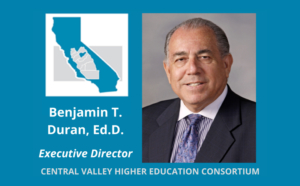 I hope you all enjoyed fabulous live commencement exercises on your campuses. We know students, family, professors, and staff have been looking forward coming together again to celebrate the accomplishments of our students in the Central Valley.
I hope you all enjoyed fabulous live commencement exercises on your campuses. We know students, family, professors, and staff have been looking forward coming together again to celebrate the accomplishments of our students in the Central Valley.
I’m sure many of you agree that one take-away from the pandemic experience – with life seemingly coming to halt the past two years amid shutdowns and event cancellations – is the renewed appreciation we find in everyday routines like pulling into the campus parking lot, crossing the beautiful landscapes of our 30 campuses across the valley, walking into classrooms and seeing those eager faces, reconvening with colleagues in the office and most significantly, sitting in an arena, stadium or any venue to bask in the joy of our students walking across the stage to receive their diploma, a celebration with their friends and families of the hard work and success by all in academia.
This summer we will continue to work on our regional initiatives like dual enrollment, creating a Central Valley transfer model and working on developing math pathways between our K12 partners and our CVHEC member institutions.
Until we usher in the fall 2022 semester together, I hope you will find some time to rest, recharge, enjoy time with your loved ones and maybe even a do little travel once again. We look forward to regrouping in August and kicking-off another impactful year.
Have a great summer!!!
CVHEC Director’s Message: Re-imagining the social and economic landscape of our region
Greetings and welcome to our June CVHEC e-newsletter,
Welcome to the end of the semester and to the first summer in two years when we are not shut down. As we emerge from the pandemic, faculty and staff at our Central Valley Higher Education Consortium member colleges and universities have been engaged in providing a great education to our students.

In this issue, please look at this month’s blog that , in light of a recent article regarding University of Californian, speaks to the Central Valley Program Pathways Mapper project that improves transfer of valley students to UC Merced as well as our three California State University campuses, Bakersfield, Fresno and Stanislaus.
We are also delighted to congratulate the Central San Joaquin Valley K16 Partnership (Fresno-Madera Collaborative & Tulare-Kings Collaborative) and the Kern Regional K16 Education Collaborative (Kern County Superintendent of Schools) on receiving $18.1 million in funding each from the state for a four-year effort to improve the educational and economic well-being of the Central Valley. Merced, Stanislaus, and San Joaquin County are pursuing a similar grant opportunity and should hear in early fall. These K16 Collaboratives that will include our CVHEC member institutions can change the very social and economic landscape of our region.
Last year, the Fresno-based K16 Collaborative served as a model for the funding that would eventually be allotted to create similar collaboratives throughout the state.
One of the initiatives funded by Fresno K16 Collaborative was the CVHEC MA Upskilling project which provided funding to support high school English and math teachers in earning their master’s degrees to allow them to teach dual enrollment college courses on their high school campuses to high school students. Dual enrollment is one of the strategies CVHEC is supporting to help move students into and through higher education. By the end of December 2022, there will be 118 new high school teachers in Fresno County holding MA degrees to facilitate the delivery of dual enrollment in our region.
I hope you enjoy the rest of the issue. We wish you a restful and safe summer.
CVHEC Director’s Message: Consortium Summit ’22 Wrap – Recapturing the Magic
CVHEC board members and May 6 summit participants enjoyed the music of Las Hermanas Medina at the Cinco de Mayo reception the day before more than 130 higher education leaders and advocates convened for the Higher Education Policy and Legislative Summit in downtown Fresno.
Greetings and welcome to our May CVHEC e-newsletter,
As the spring semester ends, there is so much to talk about. For the first time in two years, students and their families are enjoying attendance at live commencement ceremonies at colleges and universities throughout the Central Valley – you can feel the magic in the air.

Also, in a very generous gesture, institutions are honoring those graduates in 2020 and 2021 who were deprived of their commencement events by the pandemic by providing opportunities for them to participate in this year’s ceremonies as well. We know the graduates would also want to thank the staff and faculty on their campuses for helping them achieve their educational goals. Congratulations to ALL graduates and to your respective support systems!
As we celebrate our graduates, we hope you enjoy our May issue of the CVHEC Newsletter. You will see this was an exciting month for us as well. On May 5 and 6, CVHEC held its spring Board of Directors meeting and our first CVHEC Legislative and Policy Summit since 2019 live in Fresno. Participants were appreciative of the opportunity to reconnect in-person with colleagues and make new connections.
At the board meeting, the CVHEC Board of Directors was happy to welcome the University of California, San Francisco – Fresno campus as the 30th member institution of the Consortium. CVHEC also invited six newly-appointed CEOs as members of the Board.
This summit marked the 20th Anniversary of CVHEC with over 150 participants celebrating two decades worth of success by our member institutions in increasing the college-going rate for Valley residents. Please view the Summit photo gallery blog for the visual story of this very successful Summit.
Highlights of the summit include a conversation with Dr. John Welty, President Emeritus of Fresno State and founder of CVHEC, in addition to a panel of students from the region sharing how they navigated the pandemic. The annual visit and legislative update by Congressman Jim Costa also added to the day.
These highlights, the information that was shared with attendees about the initiatives in the Central Valley to improve student success, and the ability to network in a live setting were invaluable and welcome.
Enjoy our newsletter and enjoy your summer.
See: PHOTO BLOG
‘What the CV-HEC is Happening?’ Guest Blog FEB. 2022: Dual enrollment
Virginia Madrid-Salazar, Esq., was CVHEC’s strategies lead from 2015 through July 2021. In August, the San Joaquin College of Law alumna’s service to her community shifted to private law practice as a dependency attorney serving parents and minors involved in Dependency Court of the Fresno County Superior Court. She is also a board member of the Fresno County Office of Education Foundation. Not only did she utilize her skills while at CVHEC to help develop dual enrollment strategies with CVHEC member institutions and educational partners, Virginia also supported her own son’s productive dual enrollment journey – so we asked her to share some observations on dual enrollment from this unique perspective for our fourth “What the CV-HEC is Happening” Blog.
Dual enrollment: an equity change-maker
By Virginia Madrid-Salazar, Esq.
As the strategies lead for the Central Valley Higher Education Consortium, it was an honor to work alongside area educators to affect transformational changes that have occurred in the region’s higher education sphere during that period.
This blog entry gives me a welcome opportunity to share my perspective, first, reflecting on the dual enrollment work that CVHEC champions; experiencing dual enrollment in my own son’s educational career; and lastly, expressing my hope for where the Central Valley will go with dual enrollment. As a dependency attorney, I welcome the push of dual enrollment for foster youth.
Energizing for Dual Enrollment Despite Pandemic Limitations
Right before the pandemic hit, on March 5, 2020 CVHEC hosted a groundbreaking event for Central Valley higher education and K-12 educators. Nearly 200 interested educators gathered to create an action plan to create a dual enrollment model that improved the delivery of dual enrollment for the Central Valley’s rural and urban communities.
It was an energizing event. A CVHEC-convened taskforce primed the agenda to allow colleagues an opportunity to identify shared barriers to dual enrollment and devise action plans to dismantle those barriers. This collaboration proactively allowed for a valley-wide approach.
Among the needs that emerged included improving CCCApply for dual enrollment students (the application was not originally designed for use by high school students taking college-credit bearing courses and it showed); and the simple fact that not enough teachers met minimum qualifications Ito teach college courses on their high school campuses.
During the pandemic, CVHEC brought those interested parties together virtually via Zoom where these challenges were further examined and solutions were crafted.
Application Frustrations Raised and Fixed
An executive committee of the task force identified frustrations experienced by Central Valley students when enrolling in dual enrollment courses. These concerns were shared with the California Community College Chancellor’s Office team working to improve the application process.
As a result, improvements have been implemented and there are more students now overcoming that barrier.
Growing Dual Enrollment Teachers on High School Campuses
CVHEC got to work on another barrier and organized grant applications to the Fresno K-16 Collaborative to fund high school English and math teachers to earn their master’s degrees (see Dual Enrollment Upskilling Teachers Master’s Program). In December 2021, the first of three cohorts completed their degrees. Not only will these teachers teach dual enrollment courses on high school campuses, but some will serve at rural high school campuses where the need is great.
These efforts are the beginnings of improving dual enrollment for Central Valley students.
Improving dual enrollment access does not necessarily mean a student must earn their associate degree by the time they finish high school either. Rather, the opportunity to take at least six units of college-credit bearing courses – especially an English or math course – before they finish their high school career can transcend a student’s outlook on their college career.
That was my son’s experience.
Students Getting a Head Start in College Career
In his senior year of high school, my son enrolled in six units of college credit-bearing course work taking Communications and English 1A. It was the first he heard of these dual enrollment classes offered on his campus and he decided he would give it a shot. Not only did he find the course work and his instructors interesting (he earned A’s in both courses) but, perhaps more importantly, he saw himself as a college student – in that moment.
“That dual enrollment is clutch!” That was his exclamation in our kitchen with his ed plan in hand. It was clear to him he was free to take a few other courses he needed to transfer to his choice school. This was all because he got a head start on his college career with dual enrollment. All I could do was smile.
Unbridled excitement for his future. It’s an indescribable feeling to see the positive impact of transformational change. That must be what our Central Valley higher education leaders pursue as they explore how to grow dual enrollment in the valley.
Opportunities to Grow Dual Enrollment – Equitable Growth
That excitement I saw in my son – a mix of relief, inspiration and a vision he saw for himself – is for everyone. Growing dual enrollment offers an equitable growth opportunity. As of late, I’ve noticed a push for foster youth in dual enrollment. (See Career Ladders Project Dual Enrollment for Foster Youth: Toward Effective Practice.) Now as a Dependency Attorney, and not someone in the daily challenge of growing dual enrollment, I see the experiences foster youth endure and the resiliency they display and I applaud this push on their behalf.
This is where I have a unique perspective. I can see the transformation that can occur for foster youth if they participate in dual enrollment – even if it’s a few college courses. Not just because of the impact higher education can have on someone’s life, but because for a senior who is living life as a foster youth, a lot rides on that last year of high school. Let me explain.
When foster youth are not reunified with their family as they near the age of majority, they may continue to receive County support through age 21 if they work or attend college through what is known as AB 12 Extended Foster Care Program and Benefits. If foster youth can envision themselves as college material while in high school that young person will be inclined to participate in AB 12 and pursue a college education. This is a decision they make during that last year of majority or their senior year of high school. I cannot emphasize enough how a dual enrollment opportunity can transform that young person’s life.
Simply put, in all its fashions, dual enrollment cannot be denied in its ability to create long-lasting, unimaginable change.
Yes, it was such an honor to lend my skill through CVHEC to help Central Valley educators create transformational change.
I cannot wait to see what transformations take shape in the next few years and what other barriers to dual enrollment Central Valley educators will dismantle.
Check the CVDEEP Convening Website for updates and follow-up of the March 17, 2022 event.

